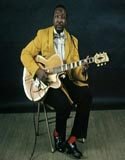Willie King

Willie King was born in Prairie Point, MS, on March 8, 1943. His grandparents and local sharecroppers raised King and his siblings after his mother and father separated when he was two. Fortunately, King was raised in a music-filled household, as his grandfather was a fan of both gospel and blues music. A young Willie King made his own didley-bo, a one-stringed instrument, by nailing a bailing wire to a tree in his yard. He began playing that and eventually progressed to guitar, when his plantation owner, brought him his first guitar, when he was 13 years old.
He made his professional debut at a house party in Mississippi, playing all night for two dollars. King focused his efforts on learning more tunes and expanded his repertoire to include tunes by Howlin' Wolf, Muddy Waters, Lightnin' Hopkins, and John Lee Hooker.
In 1967, King moved to Chicago and spent a year trying to find secure work in that city's south and west sides. He returned to Old Memphis, AL, and began working as a salesman, traveling rural roads, peddling his goods, and talking politics with mostly poor, rural Alabama residents. King got involved in the civil rights movement and with the left-wing Highlander Center.
Throughout the 1970s, King continued to write blues songs inspired by the civil rights activism of performers like Josh White, Harry Belafonte, Joan Baez, the Freedom Singers, and Pete Seeger. King calls his political songs "struggling songs," and in reality, they are political tunes used to educate his audiences. As he explains in his biography accompanying Freedom Creek, "Through the music, I could reach more people, get them to listen." MP3: Living In a New World




